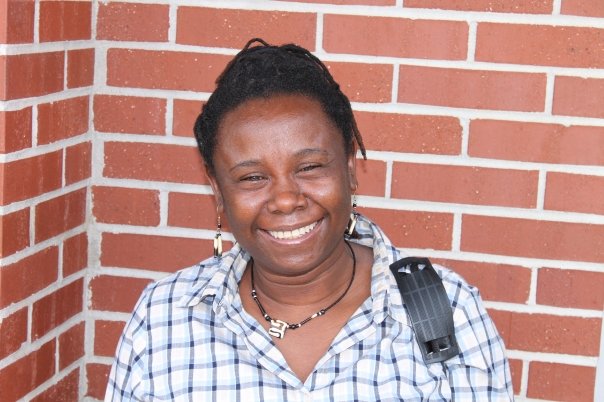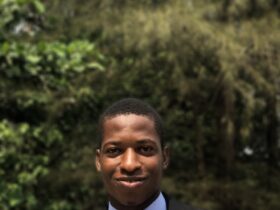
Konya Shamsrumi: What is the process of writing a poem like for you? Is it a lot of hard work or easy?
Unoma Azuah: The process of writing a poem for me starts with a flash or an idea, depending on what triggered the urge for me to write. In other words, my surroundings and lingering thoughts fuel and feed my inclination to write a poem. Sometimes I write because I am bothered about something. In that way, writing the subject or issue in the form of a poem purges me of that pain or that joy, or even that overwhelming emotion. The idea does not come as a complete package. I carry ideas around in my head for a few days or weeks. Sometimes, I carry these ideas for months. It is almost the same as the process a python takes to digest a massive meal. The manner of ingestion and assimilating that topic could take days or weeks, and that is the same process I apply to birth a poem and any creative piece. In that course, I come back to the poem to flesh out, re-arrange and polish till it feels complete because writing is re-writing. All that to say, like any fine art, the process of writing a poem or creating is not easy.
Konya Shamsrumi: Please describe your sense of identity in this or any possible world in imagery or metaphor?
Unoma Azuah: My sense of identity is multi-layered: it is complex. Think of a maze.
Konya Shamsrumi: If any of your poems could literarily save a person’s life, which poem would it be and can you describe the person whose life you think it would have saved?
Unoma Azuah: Many of my poems saved my life. I can’t say whether or not it saved anybody else’s life. If I am constrained to use just one of my poems as an example of a poem that saved my life, it would be “Dots of Lineage Lines.” It is a biographical poem. It helped me navigate the chaos of knitting through the fabric of my many layered identities. I traced the burden of always being on the fringes of life and living. For instance, I am a Nigerian lesbian woman confronting homophobia. I am a Nigerian woman with a dual identity; Igbo and Tiv. That label is burdened by its historical context because my mother formed a union with a Nigerian soldier who was supposedly an enemy to the Igbos or to the Biafra cause. Additionally, I am anti-religious in a hyper-religious country like Nigeria. Then, I am not just a woman, but a black African woman confronting racism in America. The list goes on. In other words, I tried to make sense of a senseless world in that poem as a way to stay sane. So, I ferried and still journey across many boundaries of negotiations. In some of these bargaining I lose bits of myself. In writing “Dots of Lineage Lines”, I confronted my fears, my baggage, my conflicts, my flaws, etc. It was therapeutic; the poem healed parts of me.

Konya Shamsrumi: What does Africa mean to you, as potential or reality?
Unoma Azuah: Africa means home to me: beautiful people, the continent with the pulsating heartbeat, the thump of the tropics, the familiar aroma of spices, the place with the warmth of the sun, the place where leisure embraces the calmness of life. Africa means poetry to me in all her gore and glory.
Konya Shamsrumi: Could you share with us one poem you’ve been most impressed or fascinated by? Tell us why and share favorite lines from it.
Unoma Azuah: I am impressed and fascinated by a multitude of poems, from African songs to European sonnets. However, the one that comes to mind at the moment is Elizabeth Holden’s “As the Cold Deepens.” Holden’s “As the Cold Deepens,” utilizes simple but powerful lines, metaphors and imagery to address the topic of aging and death. For instance, the poem opens with these lines about her mother: / “She is eighty-six and her friends are dying. / “They’re dropping like flies,” she grumbles/and I see black winged bodies crumbling/on window sills when we open our summer house.”/
She delivers even more powerful lines and metaphors with:
/” her flesh shrinks back toward bone. /Braced in her metal walker/she haunts the halls/, prowls the margin of her day/… erect in this support/that fuses steel with self. ”/
Here she makes us see her mother’s resolve to stay alive and not give in to death. Like a lioness marking her territory when threatened, we see her mother “haunt the halls” and prowl the margins of her days. Her grit is described as “in this support that fuses steel with self.” Even in the intensity of this theme, we still see how Holden effortlessly works in alliteration and internal rhymes. So in such a weighty issue, we hear music.
Her closing is yet potent: “It is hard to hold the light/which grows weaker every day. /The temperature is falling/The glass is cold.”
Her closure is the ultimate; it reverberates. “The glass is cold.” Apart from her impressive weaving of narration into lyricism, her craft in employing multiple mediums and images from merely working with the image of flies, their attraction to warmth, summer and the contrast of cold is formidable.
The #KSRCollective poetry combo comprises Umar Abubakar Sidi, Richard Ali, Kechi Nomu, Funmi Gaji and Rasaq Malik Gbolahan. Order all five at a discount HERE.
Unoma Azuah teaches writing at the Illinois Institute of Art, Chicago, Illinois. Her research and activism focus on Lesbian, Gay, Bisexual and Transgender (LGBT) rights in Nigeria. Recently, she concluded a book project on the lives of gay Nigerians entitled, Blessed Body: Secret Lives of LGBT Nigerians. In 2011 she was listed as one of the top professors at small private colleges in the United States in the online publication, Affordable/Private Colleges and Universities in the United States. Additionally, she is recognized by The Journal of Blacks in Higher Education under the topic, “Honors for Four Black Educators.” A prolific author and a speaker, Azuah has been a guest lecturer at such institutions as Yale University, Connecticut, USA; Queens University in Kingston, Canada; Maynooth University, Ireland; University of Cape Town, South Africa; and State University of New York, (SUNY) Oneonta. Her writing awards include the Hellman/Hammett Award; the Urban Spectrum Award for her debut novel, Sky-high Flames; and the Snyder-Aidoo Book Award for her novel, Edible Bones. Her undergraduate degree in English is from the University of Nigeria, Nsukka. She has an MA in English from Cleveland State University, Cleveland, Ohio and an MFA from Virginia Commonwealth University, Richmond, VA.
- Poets Talk: 5 Questions with Chika Jones - April 9, 2018
- Poets Talk: 5 Questions with Nyachiro Lydia Kasese - February 28, 2018
- Heart of Poetry: Tsenongu Moses Terhemba’s On His Neglect of Prose by Ismail Bala - February 6, 2018











